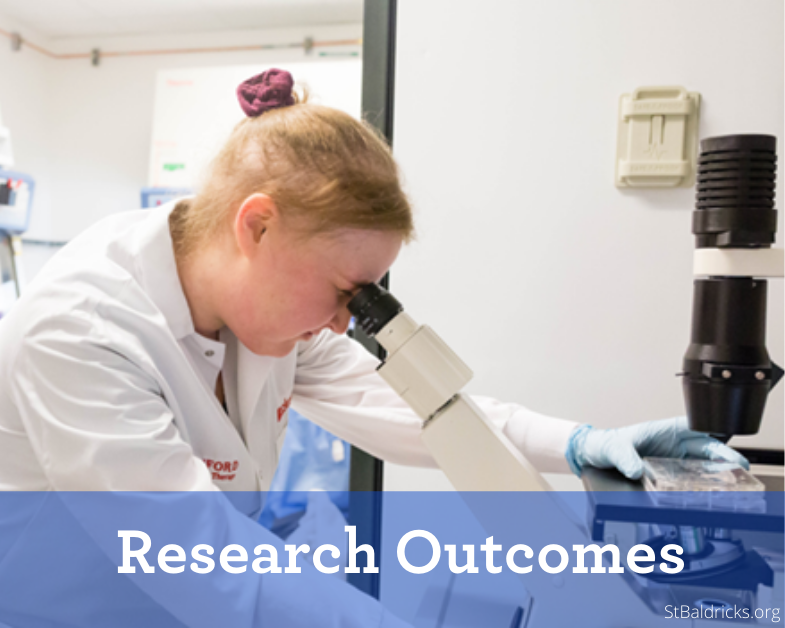Research progress and hope go hand in hand.
Thanks to your continued support, pediatric cancer researchers are making progress towards better treatments and providing hope for more cures. Here are just four examples of the many research outcomes (and reasons for hope!) you have made possible:

Finding Genetic Clues and a Potential for Targeted Therapy in Rhabdomyosarcoma
New findings suggest that children with rhabdomyosarcoma could benefit from genetic testing. Results were published in the Journal of Clinical Oncology for the largest-ever international study on rhabdomyosarcoma, led by the National Cancer Institute’s Center for Cancer Research, including St. Baldrick’s funded researcher Dr. Jack Shern. The PFP Cancer Research Fund, a St. Baldrick’s Hero Fund, supported Dr. Shern’s grant.
The researchers found the presence of mutations in several genes, including TP53, MY0D1 and CDKN2A, which appear to be associated with a more aggressive form of the disease and poorer chance of survival. If doctors can use this knowledge to predict which patients will do well and which won’t, then treatment plans can be personalized for specific patients. The scientists hope that genetic testing will be become part of the standard treatment plan for rare cancers like rhabdomyosarcoma.
Next steps also include research to identify drugs that target these mutations.
Stopping Tumor Spread in Children with Ewing Sarcoma – Before It Starts
A recent discovery in Ewing sarcoma, an aggressive and often fatal childhood cancer, has uncovered the potential to prevent cancer cells from spreading beyond their primary tumor site. The breakthrough provides new insight into what triggers the process that allows cancer cells to survive while traveling throughout the body in the bloodstream. This finding published in Cancer Discovery comes from St. Baldrick’s funded researcher Dr. Poul Sorensen. Dr. Sorensen was the recipient of a St. Baldrick’s grant funded through an anonymous $1 million donation in honor of a special teenager currently fighting Ewing sarcoma.
Improving Event Free Survival for Some Children with AML
Adding the drug gemtuzumab ozogamicin to standard chemotherapy improved outcomes in children with KMT2A-r acute myeloid leukemia (AML).
According to the study published in the Journal of Clinical Oncology researchers, including St. Baldrick’s Scholar Dr. Jessica Pollard, evaluated patients from a phase 3 Children’s Oncology Group (COG) clinical trial. Patients were randomly assigned to receive standard chemotherapy with the addition of this drug, or standard chemotherapy alone. The findings show that the addition of this drug significantly improved patient quality of life by improving event free survival (EFS), but overall survival (OS) was comparable to standard treatment. The 5-year EFS rate was 48% with the addition of this drug and 29% without it (P =.003). The 5-year OS rate was 63% and 53%, respectively (P =.054).
Additionally, of the AML patients who achieved remission, those that received the drug had lower relapse rates. Researchers believe that consolidating this combination with hematopoietic stem-cell transplantation may further enhance outcomes and they plan to study this next. (In a hematopoietic transplant, stem cells are taken from the patient’s own body or a matched donor and transplanted into the patient to form new blood cells in the body.)
Resetting the Molecular Clock Suppresses Neuroblastoma Tumor Growth
Researchers at Baylor College of Medicine, including St. Baldrick’s Scholar Dr. Eveline Barbieri, have found that restoring the normal function of the molecular clock suppresses tumor growth in advanced neuroblastoma. The molecular clock controls cell metabolism in a similar way to how the body’s circadian rhythm controls sleep cycles. The researchers also found that resetting the molecular clock can make these tumors more sensitive to chemotherapy.
As published in Nature Communications, the researchers tested approaches to restore the molecular clock in the lab. Both techniques were successful and future efforts will look to develop therapeutics that can restore the molecular clock outside the lab, in a clinical setting.
Not every publication of research supported by St. Baldrick’s makes the news, but each one adds to the body of scientific knowledge that takes us one step closer to better outcomes for kids with cancer. Your continued support will make more research possible to Conquer Kids’ Cancer.
Donate now and help support research into better treatments for kids with cancer.
Read more on the St. Baldrick’s blog:

 SBF
Tweets »
SBF
Tweets »